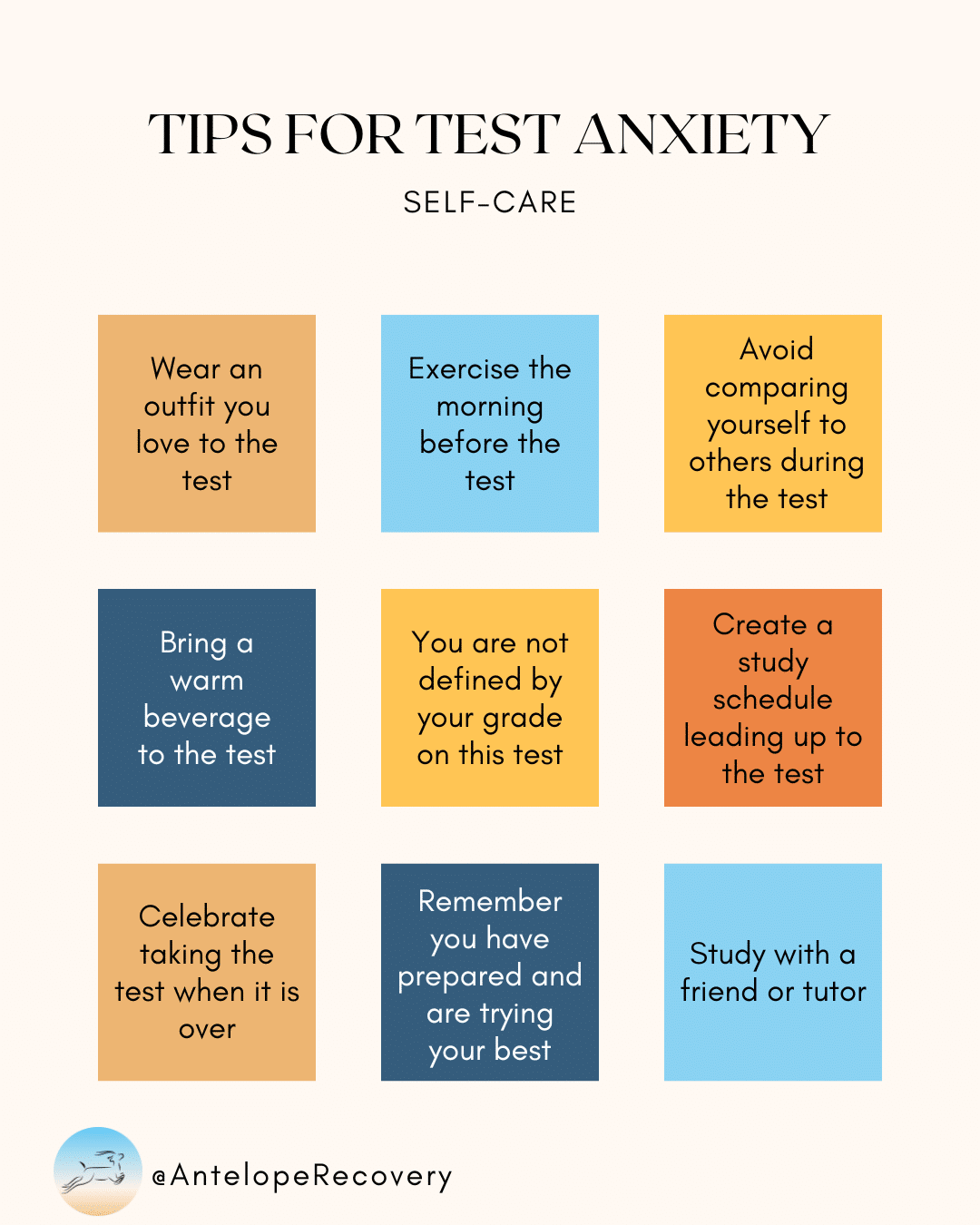As the school year nears its end, many students are preparing for final exams. While it is natural to feel a little anxious about these high-stakes assessments, some students experience overwhelming levels of anxiety that can interfere with their ability to perform well. This is known as test anxiety, and it can have serious consequences if left unaddressed. In this blog post, we will explore the topic of test anxiety among teens and provide tips for both parents and teens to help manage this common challenge.
Test anxiety is a common experience among students, particularly during their teenage years. Some stress level before a test is normal and helps motivate the student. But excessive anxiety can negatively impact a student’s performance, mental health, and overall well-being. Test anxiety can stem from perfectionistic tendencies, high expectations or pressure to perform, previous test outcomes, and fear of failure. As a parent, it’s essential to be aware of the signs of test anxiety, understand its causes and consequences, and take steps to support your teen through this challenging time.
Signs of Anxiety in your Teenager
In addition to the common signs of anxiety, teens who are anxious about school or test-taking will often be so stressed out they can’t do their homework. They will avoid and resist working in school, which worsens the problem.
Other teens will go in the opposite direction, where they are so anxious they are obsessed with doing school work and won’t stop studying to eat, sleep, or take care of other parts of their life.
Physical Signs
- Lack of sleep
- Excessive sweating
- Nausea, stomach pain, or digestive issues
- Rapid heartbeat
- Shortness of breath
- Lightheadedness or fainting
- Headaches
- Restlessness and fidgeting
Emotional Signs
- Self-doubt and insecurity
- Fear and helplessness
- Hopelessness
- Feelings of inadequacy
- Anger or irritability
- Panic attacks
Mental Signs
- Difficulty concentrating
- Procrastination and avoidance
- Frequently comparing yourself to others.
- Negative self-talk
- Racing thoughts
How Test Anxiety Can Escalate into a Mental Health Emergency:
If left unaddressed, test anxiety can evolve into a more serious mental health challenge, including depression and more pervasive anxiety disorders. Chronic stress can lead to physical health problems. It can also be detrimental to the student’s academic performance, exacerbating the academic pressure they may already feel and feeding into feelings of inadequacy and self-doubt.
Parents can play a critical role in identifying the signs of escalating test anxiety. These signs may include excessive worry, increased irritability, avoidance of school or social situations, and changes in sleep or appetite. Being proactive when your teen shows signs of increased difficulties can help them learn and practice strategies for effectively dealing with pressure throughout life. Parents can help reframe tests by emphasizing that learning and growing are more important than test scores. Encourage your teen to identify their strengths and areas for improvement, celebrate their accomplishments, and recognize that setbacks are a natural part of the learning process. Help them develop a growth mindset, where they view challenges as opportunities to learn and grow rather than failures.
Can therapy help with test anxiety?
Even just a few therapy sessions can make a big difference for a teen struggling with test or school anxiety. For many teens with test anxiety, the teen may not need only academic support such as tutoring but may benefit from learning how to perform under pressure. Therapy is very good at teaching resilience and performance mindset skills that can help to round out the academic support the teen needs. During therapy, a therapist can work with your teen on the following:
- Teaching and practicing relaxation or focusing techniques: A therapist can teach your teen relaxation techniques, such as deep breathing or progressive muscle relaxation, to help them calm down and reduce their anxiety.
- Shifting negative and self-defeating thought patterns: A therapist can help your teen identify negative thought patterns contributing to their test anxiety. They can work with your teen to challenge and reframe these thoughts in a more helpful way.
- Develop coping strategies: A therapist can help your teen develop coping strategies to manage their anxiety when it arises. This could include things like mindfulness, taking breaks, positive self-talk, or visualization.
- Practice exposure therapy: Exposure therapy involves gradually exposing your teen to the situations that trigger their anxiety, such as taking practice tests or practicing public speaking in a safe and controlled environment. A therapist can guide your teen through this process and help them build up their confidence and resilience.
- Practicing asking for help.
- Helping the teen build unconditional self-worth that is not only related to their grades.
5 Ways that parents can support an anxious teen:
- Help your teen prepare: Encourage your teen to start studying early, create a study schedule, and avoid cramming.
- Help them ask for help. Reflect back to them what techniques seem to be working well and what don’t. And offer suggestions on how they might ask for help.
- Help them with their physical health. Ensure that they get adequate sleep and nutrition while focusing on school.
- Reframe tests: Emphasize the importance of learning rather than just getting good grades. Remind your teen that tests are a way to measure their knowledge and skills, not a reflection of their worth.
- Encourage open communication with your teen: Ask them how they feel and offer support and reassurance. Listen to their concerns without judgment. Ensure that their worry about disappointing you is not the primary driver of their anxiety.
For Teens
8 Study tips every teen should know that can reduce test anxiety.
1. Don’t Cram!
It might be tempting to leave all your studying for that big exam up until the last minute, but research suggests that cramming does not improve longer-term learning.
According to an article from the American Psychological Association, students may perform well on a test for which they’ve crammed, but that doesn’t mean they’ve truly learned the material. Instead of cramming, studies have shown that studying with the goal of long-term retention is best for learning overall.
2. Plan Ahead
Having a study plan with set goals can help you feel more prepared and can give you a roadmap to follow. Procrastination is one of the biggest contributors to test anxiety.
3. Ask for Help
You don’t have to struggle through difficult material on your own. Many students are not used to seeking help while in high school, but seeking extra support is common in college. Being proactive about asking for tutoring, assistance, or office hours is a skill that will benefit a student throughout their entire academic career.
4. Use the Buddy System
Your fellow students are likely going through the same struggles that you are. Reach out to classmates and form a study group to go over material together, brainstorm, and support each other through challenges. Having other people to study with means you can explain the material to one another, quiz each other, and build a network you can rely on throughout the rest of the class—and beyond.
5. Take Breaks
The brain can only absorb so much information at a time. According to the National Institutes of Health, research has shown that taking breaks in between study sessions boosts retention.
Studies have shown that wakeful rest plays just as important a role as practice in learning a new skill. Rest allows our brains to compress and consolidate memories of what we just practiced. Make sure you allow enough time, relaxation, and sleep between study sessions so your brain will be refreshed and ready to accept new information.
6. Cultivate a Peaceful Study Space
Where you study can be just as important as how you study.
Find a space that is free of distractions and has all the materials and supplies you need on hand. Eat a snack and have a water bottle close by so you’re properly fueled for your study session.
7. Reward Yourself
Studying can be mentally and emotionally exhausting, and keeping your stamina up can be challenging.
Studies have shown that rewarding yourself during your work can increase enjoyment and interest in a given task. According to an article for Science Daily, studies have shown small rewards throughout the process can help keep up motivation, rather than saving it all until the end.
8. Review, Review, Review
Practicing the information you’ve learned is the best way to retain information.
Researchers Elizabeth and Robert Bjork have argued that “desirable difficulties” can enhance learning. For example, testing yourself with flashcards is a more difficult process than simply reading a textbook, but it will lead to better long-term learning.

Overcoming test anxiety with Antelope Recovery
Providing teens with the support they need to succeed academically and emotionally can have far-reaching positive impact. Our dedicated team offers a range of resources, including individual counseling, coping strategies, and stress management techniques, to help teens overcome test anxiety and build confidence in their academic pursuits. If you believe your teenager may be struggling with test anxiety, reach out to us today. Together, we can empower your teen to conquer their fears and achieve their full potential, both in the classroom and in life.


